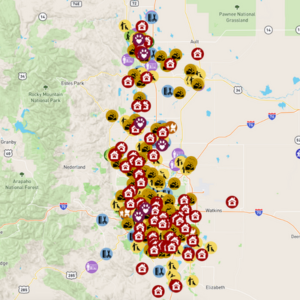The FACC has worked closely with the CU Cancer Center for more than twenty years. Together, we are partners in the world’s most advanced comparative oncology research program for pets and people.
Last year, FACC director, Dr. Rod Page, and his CU counterpart, Dr. Richard Schulick, announced a new collaborative initiative that awarded a total of $200,000 to four comparative oncology research projects. The projects were jointly funded and each includes a principal investigator from CSU and CU.
One of the projects was designed to study companion animals in the face of their guardian’s cancer diagnosis.
Jennifer Currin-McCulloch, PhD, LSW, assistant professor of social work, and Lori Kogan, PhD, professor of clinical sciences, both at Colorado State, partnered with Linda Cook, PhD, associate director for population sciences in the CU Cancer Center. They looked at the convergence of companion animals in the case of a human breast cancer diagnosis.
The group studied both the benefits breast cancer survivors gain from companion animals, as well as the pet-care stressors owners face when undergoing treatment.
Jennifer is an oncology social worker who has spent her career helping people grapple with hard diagnoses and end-of-life decisions. Lori has studied the human-animal bond for years. The two have worked together for many years.
“When we saw this grant opportunity, we went for it,” Jennifer said. “We had an unusual application but we know that there is this big gap when it comes to companion animals and cancer, and we know more research is needed.”
“For me, as an oncology social worker for more than 30 years, and a father that was a veterinarian, this is just second nature to me,” Jennifer said. “I have seen that the human-animal bond can be the thing that saves people. It can also be the thing that makes it really hard for people during treatment. We want to find ways to protect the bond and lessen the burden of animal guardianship when dealing with cancer.”
“Studying humans and animals is what drives me every morning,” Lori said. “This project gets me so excited. Humans and animals just belong together and we must preserve that bond. The community has often fallen short when it comes to helping people with their animals as they go through treatment. We must do better.”
Through their networks, Jennifer and Lori partnered with Linda Cook, PhD, associate director for population sciences in the CU Cancer Center. Linda specializes in breast cancer and was the missing piece of the puzzle. “This project has been amazing,” Lori added. “We have this perfect triangle with so many areas of expertise included. It’s all come together better than I could have imagined.”
“Our research has shown that pets can bring benefits and stressors to cancer survivors,” Jennifer said. “While they bring a lot of comfort, they also bring challenges. We’ve seen that people will delay treatment if they don’t have caregivers for their animals or they are unable to provide basic care for their animals if they get sick.”
“Helping people think about these things and address them ahead of time can remove some of the stress of a cancer diagnosis,” Lori added.
The group also notes that human oncologists need to be thinking about pets and veterinarians need to be thinking about their patient’s owners. “No one wants to overstep their role, but need to be thinking about pets and vets need to be asking about humans. There are lots of resources for cancer survivors in other areas of support, but very little for pets. We must change that to protect the benefits of companion animals,” Jennifer said.
 One of the outcomes of their work has been to create a directory of resources and services for the care of companion animals for breast cancer patients. The team built an online map that lists well over 350 businesses that provide a range of pet services from grooming to low-cost veterinary care. Graduate research associates, Amelia Malone from CSU and Savannah Schwab from CU, were instrumental in helping to make the map come to life.
One of the outcomes of their work has been to create a directory of resources and services for the care of companion animals for breast cancer patients. The team built an online map that lists well over 350 businesses that provide a range of pet services from grooming to low-cost veterinary care. Graduate research associates, Amelia Malone from CSU and Savannah Schwab from CU, were instrumental in helping to make the map come to life.
The hope is that this guide will be a resource for cancer survivors to find trusted pet care, thus removing one of the stressors that come with a cancer diagnosis. The map is interactive and very easy to use. It is also free. While it was created for breast cancer survivors, the team encourages anyone with a cancer diagnosis or other major health concern to utilize the map.
The guide is very new but it has been met with great appreciation. “We’ve heard from early users that it’s been a great resource. Nothing else like it exists so it’s our hope that people find it helpful,” Jennifer said.
“This whole process has been fantastic,” Lori said. “ We really appreciate the open-mindedness of the granting parties. This is a very innovative, non-traditional project. We’re thinking outside the box and coming up with new ways of supporting both pets and people. It’s super exciting and it’s wonderful to be able to collaborate with so many others who share our passion for this.”
Click here to find the online map directory. Watch this video to learn more about the project and hear from the team here: